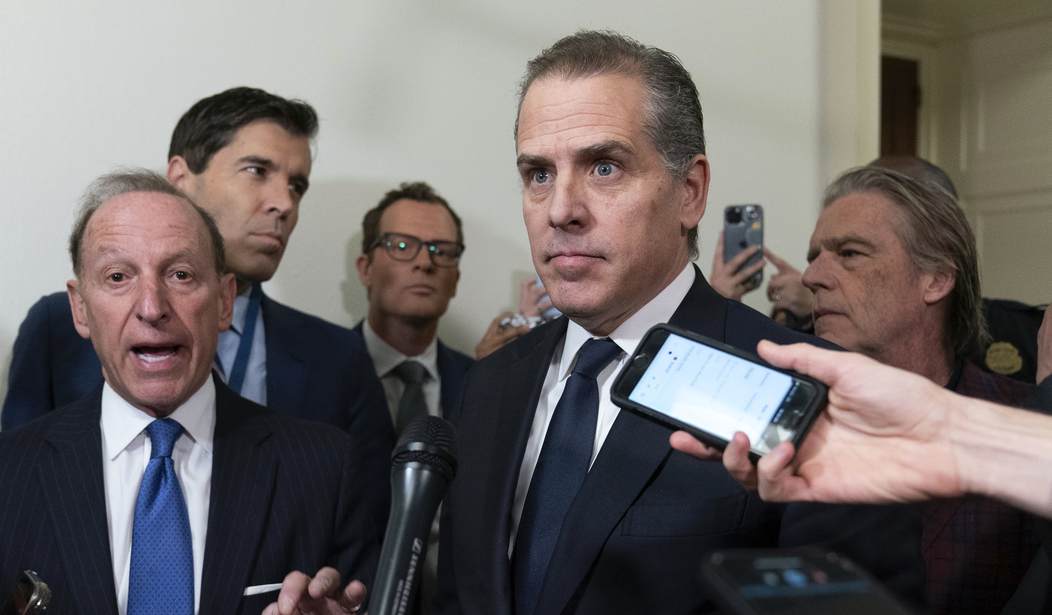A big part of Hunter Biden’s defense on federal gun charges to date has been to claim that it’s virtually unprecedented for the Department of Justice to prosecute being an unlawful user of drugs while in possession of a firearm, at least without far more serious charges attached. Biden’s being singled out for special treatment, so the argument goes, because special prosecutor David Weiss is engaged in a partisan witchhunt.
Weiss pushed back against those dubious claims in a court filing this week, declaring that “the charges in this case are not trumped up or because of former President Trump — they are instead a result of the defendant’s own choices and were brought in spite of, not because of, any outside noise made by politicians.”
Biden’s attorneys are also raising a Second Amendment claim, arguing that 18 U.S.C. § 922(g)(3) is unconstitutional. While I think his attorneys are on more solid footing in making that claim, DOJ is still regularly prosecuting others for unlawfully possessing firearms while a drug user, as well as lying on the Form 4473 when purchasing a gun. It’s entirely possible that the Supreme Court will eventually decide that the federal statute in question fails the Bruen test (as the Fifth Circuit Court of Appeals has already concluded), but until then federal prosecutors are going to continue to bring cases like this to court, and there’s no guarantee that a judge will follow the Fifth Circuit’s lead. In Tuesday’s filing, Weiss asserts that the Fifth Circuit simply got it wrong, arguing that Anglo-American law has “long recognized that the government may disarm those who, by their conduct or characteristics, present an increased risk to public safety if they possess firearms.”
Weiss cites several examples of British common law, including the 14th-century Statute of Northampton, which prohibited carrying arms “accompanied with such Circumstances as are apt to terrify the People.” But when it comes to a national tradition here in the United States of disarming unlawful users of drugs (or an historic analogue that’s comparable to the modern statute in question), Weiss falls short of offering any compelling evidence that 18 U.S.C. § 922(g)(3) is part of a longstanding national tradition. He brings up 19th-century surety laws, but those only required some individuals deemed to be a heightened public safety risk to post a bond before they could lawfully carry. There was no outright prohibition on carrying, even for those who were thought to pose a threat to the public.
Weiss also cites several statutes in the decades before and after the Civil War, but none of those come close to the federal prohibition in question. Weiss points to a South Carolina statute enacted during Reconstruction, for instance, that declared “no disorderly person, vagrant, or disturber of the peace, shall be allowed to bear arms.” Seems to me that it would have been easy for the lawmakers who drafted that restriction to include “habitual drunkard” to the category of prohibited people, but they chose not to do so. Instead, as the Fifth Circuit found, there were plenty of prohibitions on possessing or carrying guns while intoxicated, but prohibitions on consumers of alcohol simply aren’t found in the historical record.
In fact, virtually all of the laws that Weiss cites are either outliers or come far too late to play a role in the text, history, and tradition test adopted by the Supreme Court. Weiss is right that DOJ’s prosecutions for violations of § 922(g)(3) aren’t confined solely to the president’s son, but I’d say his brief falls far short of providing convincing and compelling evidence that the statute in question is compatible with our Second Amendment rights.









Join the conversation as a VIP Member